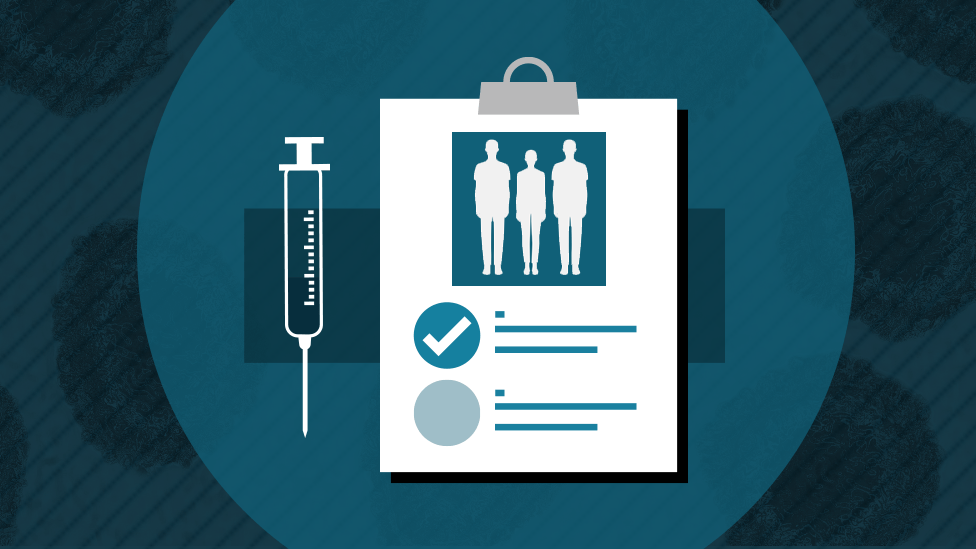Why is Scotland slowing its vaccination programme?
- Published
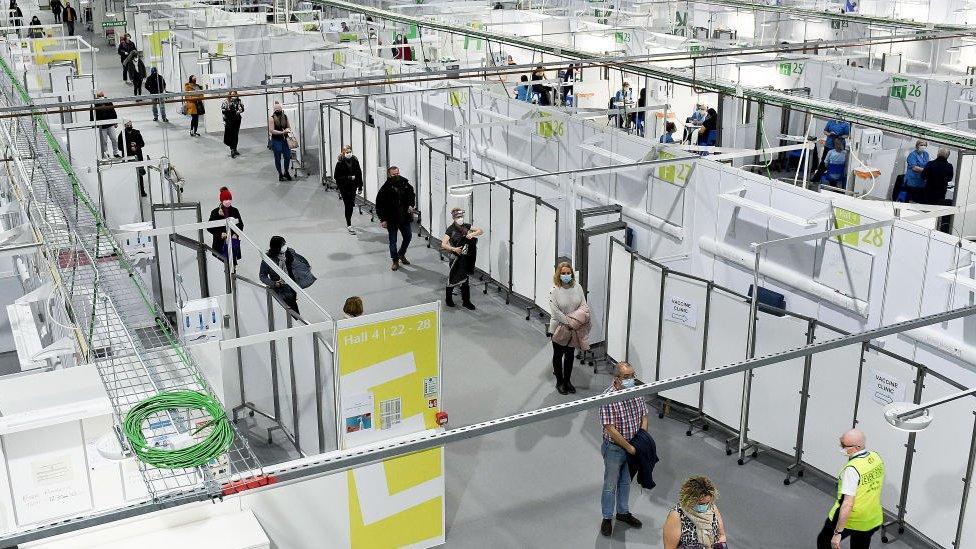
First Minister Nicola Sturgeon has said Scotland's vaccination programme is slowing down because of supply problems.
Ms Sturgeon told Holyrood on Tuesday that vaccine manufacturer Pfizer had not reduced the overall number of doses Scotland will get but it had "re-phased" the delivery.
This meant there would slightly less supply than originally expected over the next few weeks, she said.
The first minister said Scotland had now vaccinated more people than originally outlined in the deployment plan and also that some vaccines would need to held back for second doses.
On Monday, there were 32,814 people given the first dose, just above half of the 61,299 on the same day the previous week.
Last week, an average of almost 47,000 people per day were given the first dose of the vaccine. That compares with 36,000 the previous week and less than 20,000 in the seven days before that.
After complaints that the Scottish programme was "lagging behind" the other UK nations, it had done much better over the past two weeks to catch up.

So, how are the nations doing?
More than 1,288,000 people in Scotland had been given the first dose by 16 February - 28.36% of people aged 16 and over.
That figure is now very close to England (28.77%)
And above Northern Ireland (27.34%)
But it is below the rate for Wales (30.74%).
It is understood that the Scottish government had been allocated more than 800,000 doses of the Pfizer vaccine by the first week of February and more than 650,000 doses of Oxford Astra-Zeneca - making more than 1.45 million doses.
However, if supplies are to slow over the next few weeks they would soon exhaust any excess supply.
The actual figures for the numbers of doses received and expected are no longer published following a disagreement with the UK government over whether the data was sensitive in an international marketplace for the vaccine.
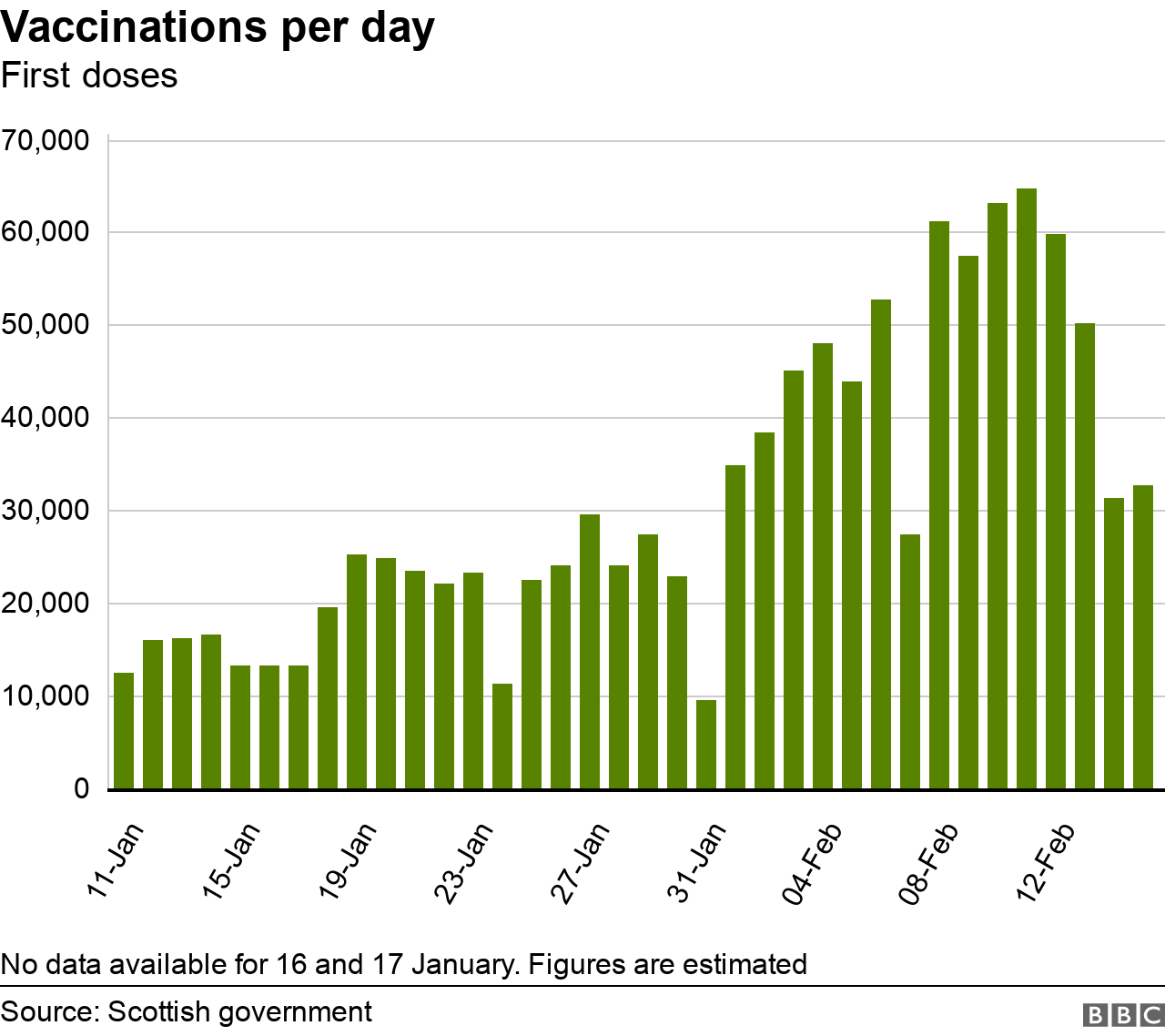

Last week, Health Secretary Jeane Freeman told BBC Radio Scotland's Good Morning Scotland programme: "This is about the supply into the UK, it is not about distribution around the UK. So it will affect all four nations of the UK.
"That will reduce our expected supply next week and the week after by about somewhere between 120,000 and 190,000 doses a week overall over the two vaccines."
She said that would mean "we will need to scale back a bit". Ms Sturgeon, speaking at her briefing on Monday, said the daily tally for the next week would likely be no more than 30,000 a day.
Caroline Lamb, the chief executive of NHS Scotland, also told a Holyrood committee that a further "dip" was expected towards the end of March.
Will targets still be met?
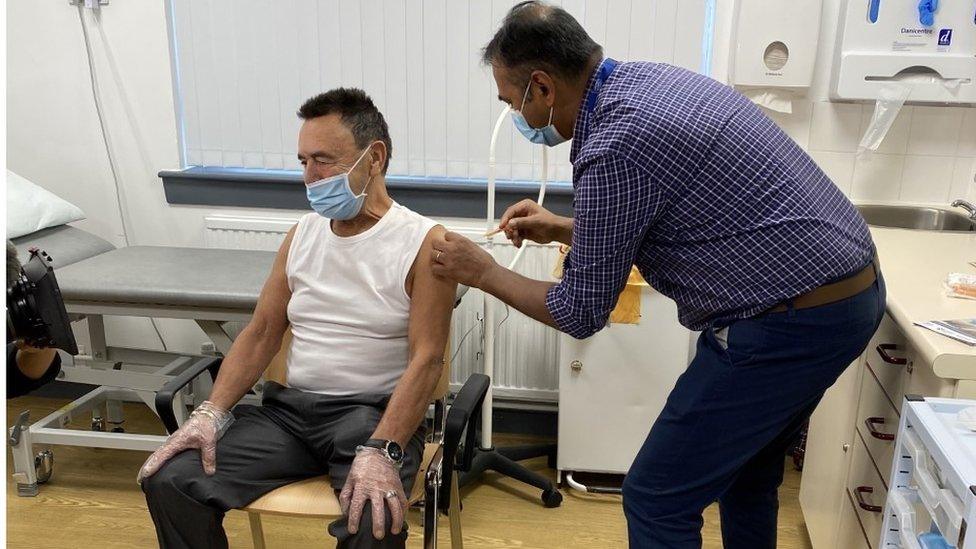
The 15 February was a major deadline for the vaccine programme, with a target of giving the first dose to everyone aged 70 and over as well as those who are clinically extremely vulnerable.
Along with previous vaccinations for health and social care staff and care home residents and staff, this came to a total of 1.14 million people.
A further 280,000 people aged 65 to 69 will need to be given their first dose by early March.
After that, the target is to give a jab to everyone over 50 and people under 65 with serious health conditions and unpaid carers by the start of May.
That is a further 1.96 million people.
Very roughly, that target will require vaccine doses to average 28,000 a day but there will also soon be the need to factor in second doses.
What's happening with second doses?
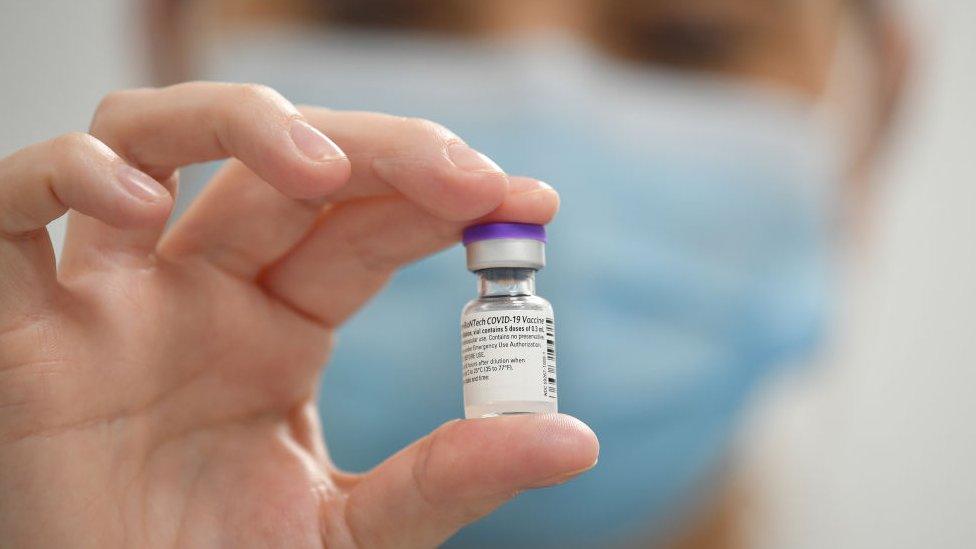
So far Scotland has done very few second doses - just 17,137.
That is because of the decision to extend the time period allowed to administer the second dose to 12 weeks.
The first Pfizer vaccines were given in the week beginning 8 December.
The people who got the first dose then will need their second dose in the next two weeks.
However, only 115,000 people were given the vaccine in the first month of the programme so the number of people who need to be given a second dose before the end of March is quite low - adding an average of 2,500 per day to the vaccine total.
The latest figures show 2,636 people were given a second dose on Monday, the most on any single day so far.
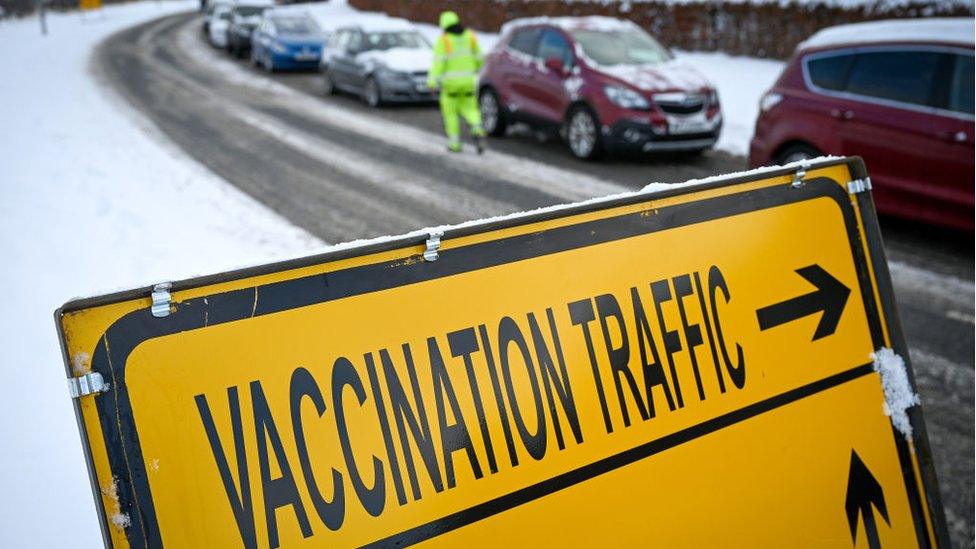
A record number of people were vaccinated on Wednesday despite many parts of the country seeing extreme weather conditions
Scotland opened three mass vaccination centres two weeks ago and a number of other large centres have also come on stream.
This has allowed Scotland to ramp up its programme considerably, some days giving vaccines to more than 60,000 people, well over 1% of the adult population each day.
However, the NHS Louisa Jordan in Glasgow has now halted vaccinations on two days this week because of shortage of supplies.
Other centres have also reduced their hours of operation and the number of appointments.
Are other UK nations slowing up too?
A UK government spokeswoman said last week: "There is currently no issue with vaccine manufacture or supply and we are still confident that the steady, regular supply of doses will continue to support the vaccine rollout right across the UK in the weeks ahead."
However, it is understood some mass vaccination centres in Wales are expected to reduce their operating hours in response to a planned dip in supply.
Health Minister Vaughan Gething said they would factor in the 'temporary slowdown' of vaccine supply over the next couple of weeks but that had been worked into their plans.
A spokeswoman from Northern Ireland's Department of Health said they were not aware of any issues.


A spokesman for Pfizer said it had made modifications to production facilities in Belgium to scale up manufacturing capacity in Europe, with "overall projected supply" of vaccines to the UK remaining the same for January to March.
It was revealed last month that the UK was set to face short-term delays in delivery of the Pfizer jab as the pharmaceutical company upscaled production capacity at its plant in Puurs, Belgium.
A Pfizer spokesman said that following the completed work it was fulfilling deliveries to the European Union "in line with the original agreed schedule" and was working towards increasing deliveries beginning the week of 15 February.
They added: "In the UK, we are continuing to liaise closely with the government to deliver the 40 million doses of the Pfizer/BioNTech vaccine that we have committed to supply before the end of the year and can confirm that overall projected supply remains the same for quarter one [January to March]."

LOCKDOWN: Six months that changed our lives
REMEMBRANCE: The loved ones lost to coronavirus

Related topics
- Published15 February 2021
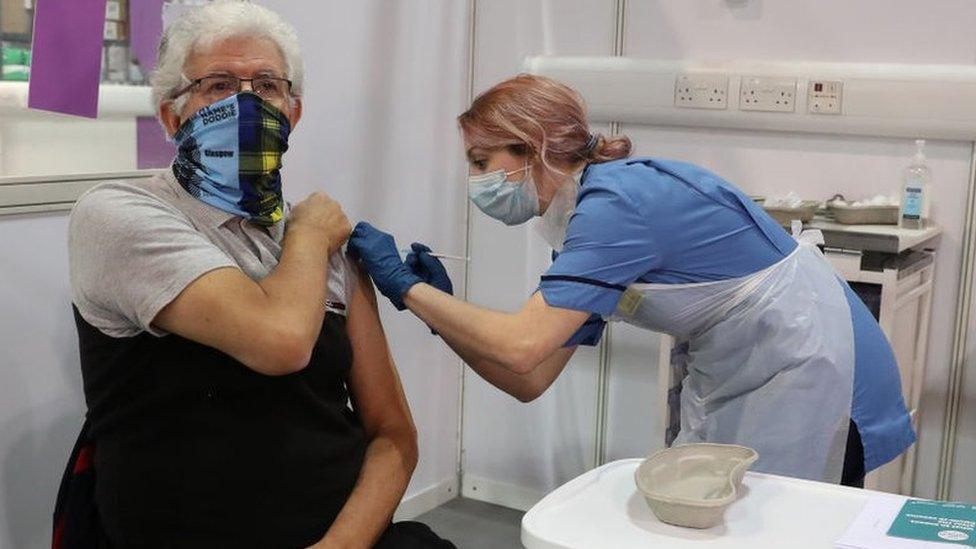
- Published11 February 2021
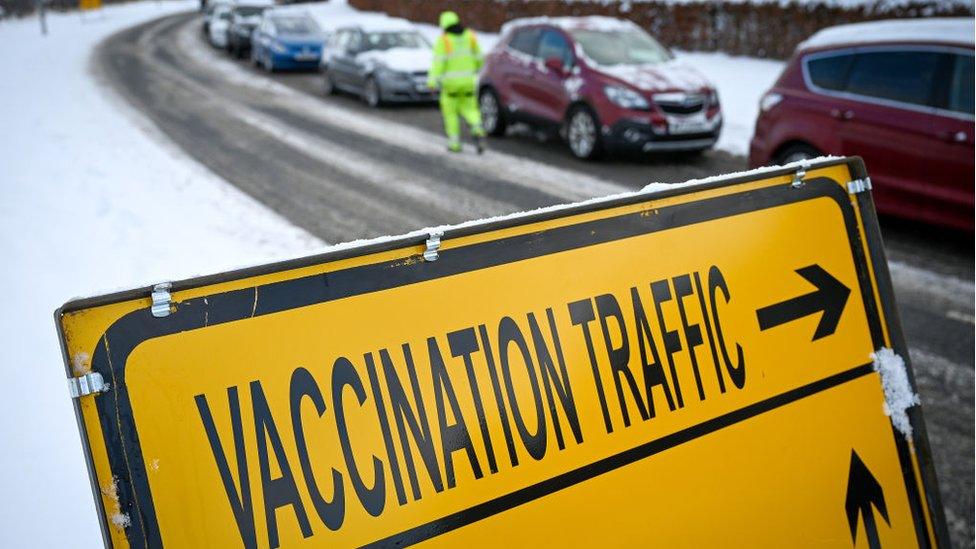
- Published17 February 2021
